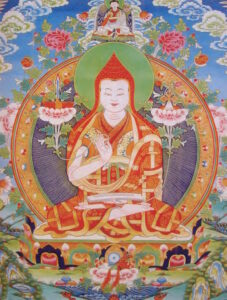
Patrul Rinpoche’s Discussions on the Root Guru
Patrul Rinpoche to a certain venerable monk:
Since my youth, I have encountered the Dharma, taken refuge, studied, and practiced various sutras and treatises. However, due to my vile nature and deep-seated habits, I have repeatedly violated the Pratimokṣa vows and the Vajrayana samayas.
Though I have diligently practiced in this life, my mind has never even attained the samadhi of the desire realm, and my accomplishments in the three trainings of discipline, concentration, and wisdom remain vastly deficient.
Due to many years of studying the Dharma, I have come to have written numerous works on both the exoteric and esoteric teachings which have widely received many praises from both the Nyingma and Sarma schools. They often advise me that if I could serve to establish broad Dharma connections with the public, that would naturally be very good.
I am also well aware that such activities could bring me both leisure as well as profit. However, as stated in the treatise “The Way of the Bodhisattva”:
Oh, I am rich and well respected; Lots of people take delight in me. If I hold on to this pride, I will surely encounter fear after death!
Therefore, I do not dare to consider myself one of those good teachers or accomplished practitioners that some people refer to; such action may violate the precept of lying about one’s level, so I dare not deceive or hold anything back, but speak the truth directly.
Although I have a little knowledge of the Dharma, I have no realization at all. I am comparable only to the group of six monks in the past. Therefore, I dare not deceive sentient beings. Even if someone comes to pay respects or seek blessings, there is no benefit gained from me.
However, what is faith? Faith means putting your trust in the Three Jewels.
In particular, among the Three Jewels, the Jewel of Dharma should be given the most importance, for the Jewels of Buddha and Sangha derive their excellence from the Dharma. Thus, we must have faith in the Dharma.
What is Dharma? The excellent explanation that can discern the Four Noble Truths is called the Dharma.
These Four Noble Truths embody the understanding of cause and effect, as well as profound faith in cause and effect; nothing mentioned in the Tripitaka of Sutras, Vinaya, and Abhidharma is beyond this.
If one thinks they can gain faith merely by observing someone’s behavior or listening to their preachings, that is nothing but self-deception. This is called “great wrong view.”
Dharma practice requires you to observe the three poisons inwardly, to remedy them as much as possible, and to practice this widely.
As the master of Oddiyana said, “If the three poisons are completely eliminated, what is the need for the Dharma?”
The masses do not understand this point and continue to seek external signs, pointing out holy mountains, sacred rocks, holy trees, or holy water.
Teachers and slippery Buddhists like this seek around anxiously, believing they can receive great blessings from other people. Such ideas only lead to madness and are utterly meaningless.
Having deep faith in and praying to your guru brings greater merit.
The Root Guru, mentioned in the scriptures and by great masters refers to the root guru who possesses the three kinds of kindness to you, not just any elder, monk, lama, or senior practitioner.
However, what is the root guru? As stated in “A Guide to Guru Yoga”: “The perfect lord of the mandala is your root guru.”
What does this mean? The one whom you firmly believe you can receive empowerments and pith instructions from is your root guru.
The faith in your guru comes from your gratitude for your guru’s kindness towards you, not from your guru’s own merits.
You must deeply believe that the guru surpasses all the Buddhas.
Why does the guru surpass the Buddhas? Because the guru directly points out the Dharmakaya of your mind, thus the kindness he shows towards me surpasses that of all Buddhas.
Furthermore, everyone says “the root guru with great kindness”, but what does “great kindness” mean?
The great compassion of the guru can make the Dharma enter my heart, and therefore the guru is called root guru.
Therefore, simply attending teachings or receiving empowerments from some gurus does not make them your root guru.
Master Atisha had many teachers, but his most extraordinary root guru was the great master Serlingpa (literally the master from Suvarnadvipa).
It is said: “To bring joy to a beggar, you should fill their bag with rice; the rice in a rich man’s granary, no matter how much, does not benefit a beggar.”
The scriptures say: “Filial piety towards one’s own parents comes from a sense of gratitude for their kindness, not from their authority and power over you.”
So, what is faith? What is practicing Dharma? And what is praying to the guru? Many who call themselves wise people and great khenpos today know nothing of these three!
Therefore, today I will give this advice which does not contradict with the scriptures. This is for the sake of creating Dharma connections, so it must be widely circulated and lectured.
It is worth great rejoicing if one or two people may fortunately be able to believe it and act on it.
This concludes my words. There is no need for you to stay long.
Even if you stay for many years, it is still meaningless to give you blessings by patting on your head, or pray for you, so I will never do those things. Instead, you must understand what was said above.
Om Mani Padme Hum
Written by Patrul Rinpoche
Respectfully translated by Tsering Phuntsok Recorded by Disciple Chok Bao New Year’s Greeting, Jan 1, 2011.
Chinese version 巴竹法王談根本上師 Facebook link
